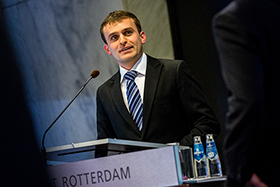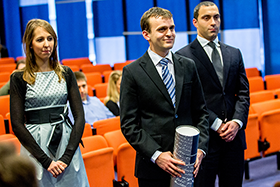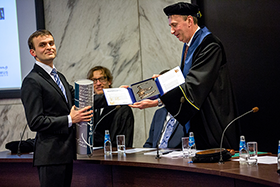PhD Defence: Empirical Studies on Actively Managed Mutual Funds
 There is an approximate US$ 27 trillion invested in mutual funds worldwide, with a substantial effect on pension funds and personal savings, and yet people don’t always know what goes on behind closed doors. New regulations requiring more frequent disclosure of information, put forward in the USA in 2004, aimed at improving transparency and giving more insight about what was really going on in the fund industry. In his PhD dissertation entitled ‘<link doctoral-programme phd-in-management phd-projects detail>Empirical Studies on Actively Managed Mutual Funds: New Insights into the Costs and Benefits of Portfolio Disclosure’, Teodor Dyakov now reveals that this disclosure of more information is not always beneficial to funds’ investors.
There is an approximate US$ 27 trillion invested in mutual funds worldwide, with a substantial effect on pension funds and personal savings, and yet people don’t always know what goes on behind closed doors. New regulations requiring more frequent disclosure of information, put forward in the USA in 2004, aimed at improving transparency and giving more insight about what was really going on in the fund industry. In his PhD dissertation entitled ‘<link doctoral-programme phd-in-management phd-projects detail>Empirical Studies on Actively Managed Mutual Funds: New Insights into the Costs and Benefits of Portfolio Disclosure’, Teodor Dyakov now reveals that this disclosure of more information is not always beneficial to funds’ investors.
One of most important questions to regulators and economists is: more or less regulation? Mutual fund managers must disclose the compositions of fund portfolios on a quarterly basis. Dyakov’s research shows how the availability of information where mutual fund managers invest someone’s stocks exposes the funds to predatory trading. The problem is particularly important for funds in distress, that have to quickly sell assets in order to meet the redemptions from existing investors, unhappy with the funds’ poor performance. Armed with comprehensive portfolio information, outside investors can anticipate such asset sales and trade in advance of mutual funds, in order to benefit from the price impact of their sales. Such front-running has the potential to further aggravate the performance of funds in distress, since it lowers the liquidation price of their assets.
 Dyakov’s research further challenges a long held belief that investors in mutual funds are naïve and inexperienced when selecting mutual funds. He shows how the disclosed information on the composition of the portfolios of fund managers is used by investors in order to separate skilled from unskilled fund managers. Moreover, he shows that investors direct their investments towards funds with a superior future performance, thus showing that investors are probably more sophisticated than previously assumed. Thus, Dyakov’s research points to the multifaceted nature of regulation in the mutual fund industry, showing that disclosure of information can bring benefits but also incur costs to the investors in mutual funds.
Dyakov’s research further challenges a long held belief that investors in mutual funds are naïve and inexperienced when selecting mutual funds. He shows how the disclosed information on the composition of the portfolios of fund managers is used by investors in order to separate skilled from unskilled fund managers. Moreover, he shows that investors direct their investments towards funds with a superior future performance, thus showing that investors are probably more sophisticated than previously assumed. Thus, Dyakov’s research points to the multifaceted nature of regulation in the mutual fund industry, showing that disclosure of information can bring benefits but also incur costs to the investors in mutual funds.
The last part of Dyakov’s thesis investigates whether the mutual fund industry adds value to investors. He investigates the performance of the trades of fund managers. If managers are skilled, they would buy stocks before their prices increase and sell stocks right before their prices decrease. The answer would be completely different now than in the 90s. Dyakov’s study shows that prior to 2001, fund managers demonstrated substantial stock picking skills which have since then disappeared. He investigates what has caused this and shows that an important, although not sole reason for this effect is reduction in selective access to firm information following the implementation of Regulation Fair Disclosure in 2001.
Teodor Dyakov defended his dissertation at Erasmus University Rotterdam on Friday 17 January, 2014 . His supervisor was <link people marno-verbeek>Professor Marno Verbeek and his co-supervisor was Dr. Hao Jiang. Other members of the Doctoral Committee were <link people mathijs-van-dijk>Professor Mathiijs van Dijk, <link people patrick-verwijmeren>Professor Patrick Verwijmeren (both of Erasmus University Rotterdam), and Dr. Clemens Sialm (University of Texas at Austin).
About Teodor Dyakov
 Teodor Dyakov (1987, Bulgaria) studied Mathematics and Computer Science at the Akademik Nikola Obreshkov High School of Mathematics and Natural Sciences. Then he continued his education in Bremen, Germany, where he obtained his BA degree in Integrated Social Sciences from Jacobs University in 2008. Between 2008 and 2010 Dyakov did his MPhil studies in Finance at Rotterdam School of Management, Erasmus University (RSM) and graduated cum laude. Dyakov joined RSM’s department of Finance as a PhD candidate in October 2010. During his PhD studies, Dyakov spent four months as a visiting PhD student at the NUS Business School in Singapore in 2012. He presented his work at numerous conferences, including the FMA European Conference in Istanbul (2012) and Luxembourg (2013) and at the Swiss Society for Financial Market Research in Zürich (2012). Dyakov's current research interests span institutional investors and asset pricing.
Teodor Dyakov (1987, Bulgaria) studied Mathematics and Computer Science at the Akademik Nikola Obreshkov High School of Mathematics and Natural Sciences. Then he continued his education in Bremen, Germany, where he obtained his BA degree in Integrated Social Sciences from Jacobs University in 2008. Between 2008 and 2010 Dyakov did his MPhil studies in Finance at Rotterdam School of Management, Erasmus University (RSM) and graduated cum laude. Dyakov joined RSM’s department of Finance as a PhD candidate in October 2010. During his PhD studies, Dyakov spent four months as a visiting PhD student at the NUS Business School in Singapore in 2012. He presented his work at numerous conferences, including the FMA European Conference in Istanbul (2012) and Luxembourg (2013) and at the Swiss Society for Financial Market Research in Zürich (2012). Dyakov's current research interests span institutional investors and asset pricing.
Abstract of Empirical Studies on Actively Managed Mutual Funds: New Insights into the Costs and Benefits of Portfolio Disclosure
Dyakov’s dissertation bundles three empirical studies on actively managed mutual funds. His studies provide new knowledge of the costs and benefits of portfolio disclosure and shed more light into the question whether mutual fund investors have an information advantage over other market participants. Chapter 2 develops a simple trading strategy which front-runs the anticipated forced sales by mutual funds experiencing extreme capital outflows. The findings in this chapter suggest that publicly available information on fund holdings exposes mutual funds in distress to predatory trading. Chapter 3 studies investors’ sophistication and shows that mutual fund investors are probably more sophisticated than previously thought. The evidence in this chapter suggests that investors use portfolio holdings information in order to infer managerial skill and benefit from shifting capital towards skilled fund managers. Thus, while chapter 2 provides evidence for the potential costs of portfolio disclosure, chapter 3 quantifies the benefits from the actual use of portfolio holdings information by mutual fund investors. Chapter 4 uses disclosed fund holdings in order to study the information content of mutual funds' trades. The study documents that prior to 2001, stocks purchased by funds outperform stocks they sell. However, the opposite happens after 2001. The findings in this chapter suggest that mutual fund managers might have lost their information advantage over time. An important, although not sole reason for this effect is reduction in selective access to firm information following the implementation of Regulation Fair Disclosure in 2001.
- <link doctoral-programme phd-in-management phd-projects detail>Download Teodor's dissertation
- View photos of his defence
Photos: Chris Gorzeman / Capital Images


